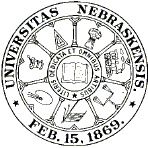
University Studies (University of Nebraska) (1888–1984)
Date of this Version
1923
Citation
UNIVERSITY STUDIES, VOL. XXIII, JULY-OCTOBER, 1923, No. 4.
Abstract
Physiology and ecology depend for their constructive development largely upon the applications of physico-chemical concepts to living organisms and their environment, to their life processes, reactions, and interrelations. A concept is valuable biologically in so far as it can be applied and used as a tool for better understanding of the phenomena related to life. Ecology, as the study of the relations between organisms and their environment and of the interrelations of organisms, depends primarily upon the findings of physiology (Clements, 1905). But to apply physicochemical concepts and hence make them of value to the physiologist or ecologist commonly requires practicable instrumental methods, and the lack of these often causes a valuable concept to remain sterile, so far as the physiologist or ecologist is concerned, for years after it might have been profitably applied. It is but recently that physiologists and ecologists have made full use of electrolytic dissociation of acids in their field of work although the essential facts were clearly set forth by Arrhenius in 1887 and 8, the recent activity of biologists in this field having followed the development not of the concept but of suitable colorimetric and electrometric methods. Physiology and ecology, as well as the applied branches of biology such as agriculture and forestry, seem fated to lag far behind their physico-chemical opportunities.
Experimental physiology and ecology, as distinguished from descriptive, are at present in great need of improved methods and instruments. Recent developments in physical, colloidal, and organic chemistry have left the biologist. far behind. Even a branch of phyto-chemistry so well developed as the chemistry of pigments has still to receive its full physiological and ecological application. A method, an instrument or other tool capable of use by the biologist is always a prerequisite to the application of a concept; physiological-ecological investigation still depends upon the development of simple practicable methods and instruments. But with the growing detail of biology, chemistry, and physics the accuracy and often the complexity of methods and instruments must be increased. The time has passed when an investigator needs only the training and skill of a tinker. Many of our methods are crude in the extreme and further progress must await refinements both of methods and instruments. The man who successfully essays physiological-ecological experimentation must have a reserve of physico-chemical training and skill as well as a biological background; a glance through any of our periodicals will, however, reveal how little this is appreciated.
Field experimentation in biology is the most backward phase of the subject. It may be easy and even recreational to make collections, descriptions, and observations in the field; it takes one out of doors and into interesting places and there is seldom need to go during inclement weather, but field experimentation is quite a different matter; circumstances are hard, apparatus is ill-suited to field work, and conditions are so variable and can be controlled so imperfectly that conclusions must be carefully tested from every possible angle. The increasing accuracy, delicacy, and complexity of modern biological work impose more and more difficult conditions upon the field experimenter who must have apparatus not only accurate enough to meet the requirements of the case but strong enough to withstand the severe use to which field conditions subject it and simple enough to be usable in the field where many facilities common to laboratories are unobtainable. Field experimentation in physiology and ecology is retarded because of the lack of suitable instruments which are accurate, simple, and sturdy. The very difficulties of the field have, however, produced attractive opportunities, for not only are there truths to be found which have entirely escaped the laboratory worker but many experimentally. established facts still await the fuller confirmation and understanding that only field work can give.
The instruments described below are accurate if properly employed, simple, compact, strong, and inexpensive; the methods of use require only supplies which may readily be carried into the field. It is hoped that by their use field workers may be provided with a new means of progress.
Included in
Arts and Humanities Commons, Biochemistry, Biophysics, and Structural Biology Commons, Bioinformatics Commons, Ecology and Evolutionary Biology Commons


Comments
PUBLISHED BY THE UNIVERSITY OF NEBRASKA